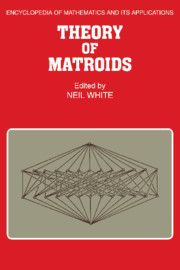Book contents
- Frontmatter
- Contents
- List of Contributors
- Series Editor's Statement
- Foreword
- Preface
- Chapter 1 Examples and Basic Concepts
- Chapter 2 Axiom Systems
- Chapter 3 Lattices
- Chapter 4 Basis-Exchange Properties
- Chapter 5 Orthogonality
- Chapter 6 Graphs and Series-Parallel Networks
- Chapter 7 Constructions
- Chapter 8 Strong Maps
- Chapter 9 Weak Maps
- Chapter 10 Semimodular Functions
- Appendix of Matroid Cryptomorphisms
- Index
- ENCYCLOPEDIA OF MATHEMATICS AND ITS APPLICATIONS
Chapter 5 - Orthogonality
Published online by Cambridge University Press: 05 May 2010
- Frontmatter
- Contents
- List of Contributors
- Series Editor's Statement
- Foreword
- Preface
- Chapter 1 Examples and Basic Concepts
- Chapter 2 Axiom Systems
- Chapter 3 Lattices
- Chapter 4 Basis-Exchange Properties
- Chapter 5 Orthogonality
- Chapter 6 Graphs and Series-Parallel Networks
- Chapter 7 Constructions
- Chapter 8 Strong Maps
- Chapter 9 Weak Maps
- Chapter 10 Semimodular Functions
- Appendix of Matroid Cryptomorphisms
- Index
- ENCYCLOPEDIA OF MATHEMATICS AND ITS APPLICATIONS
Summary
INTRODUCTION
The notion of orthogonality of combinatorial geometries and of matroids is an abstraction of the usual notion of orthogonality in vector spaces and of perpendicularity in Euclidean geometry. We shall show, for instance, how, relative to any fixed basis X for an n-dimensional vector space T, every subspace V ⊆ T defines a vector geometry on the set X, and orthogonal complementary subspaces V and V⊥ define orthogonal geometries.
We begin this chapter with the abstract combinatorial definition of orthogonality. After some necessary preliminary work on vector geometries, we shall show how orthogonal complementary subspaces give rise to orthogonal geometries, and what this construction implies for matrices and for dual vector spaces. We shall bring the chapter to a close with two further examples of orthogonality of combinatorial geometries as they arise in the study of simplicial geometries and of structure geometries.
Two notes of caution are in order. First, the operation G → G* taking each matroid G to its orthogonal matroid G* is an operation of period 2. This is not so for geometries. If a geometry G has bonds only of cardinality 1 or 2, these become circuits of cardinality 1 or 2 in the orthogonal matroid. That is, they become loops or multiple points that disappear in the passage from the matroid G* to its associated geometry. These elements will not reappear in the geometry G**, if orthogonality is taken to be an operation on geometries, rather than on matroids.
Information
- Type
- Chapter
- Information
- Theory of Matroids , pp. 76 - 96Publisher: Cambridge University PressPrint publication year: 1986
Accessibility standard: Unknown
Why this information is here
This section outlines the accessibility features of this content - including support for screen readers, full keyboard navigation and high-contrast display options. This may not be relevant for you.Accessibility Information
- 2
- Cited by
